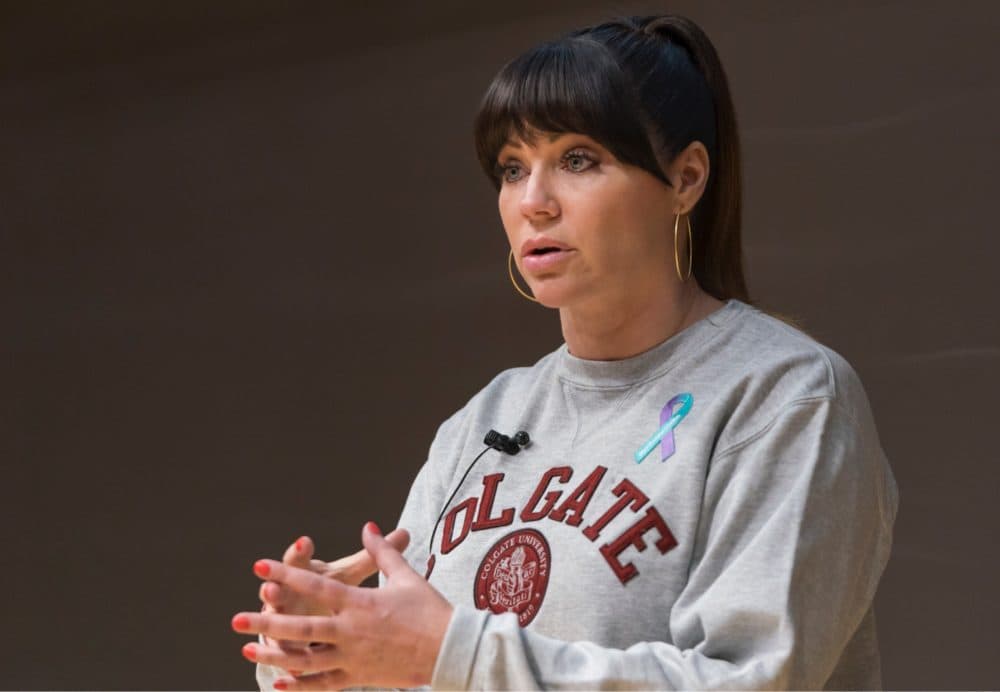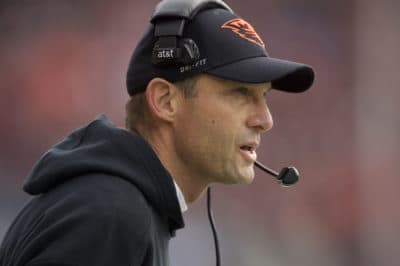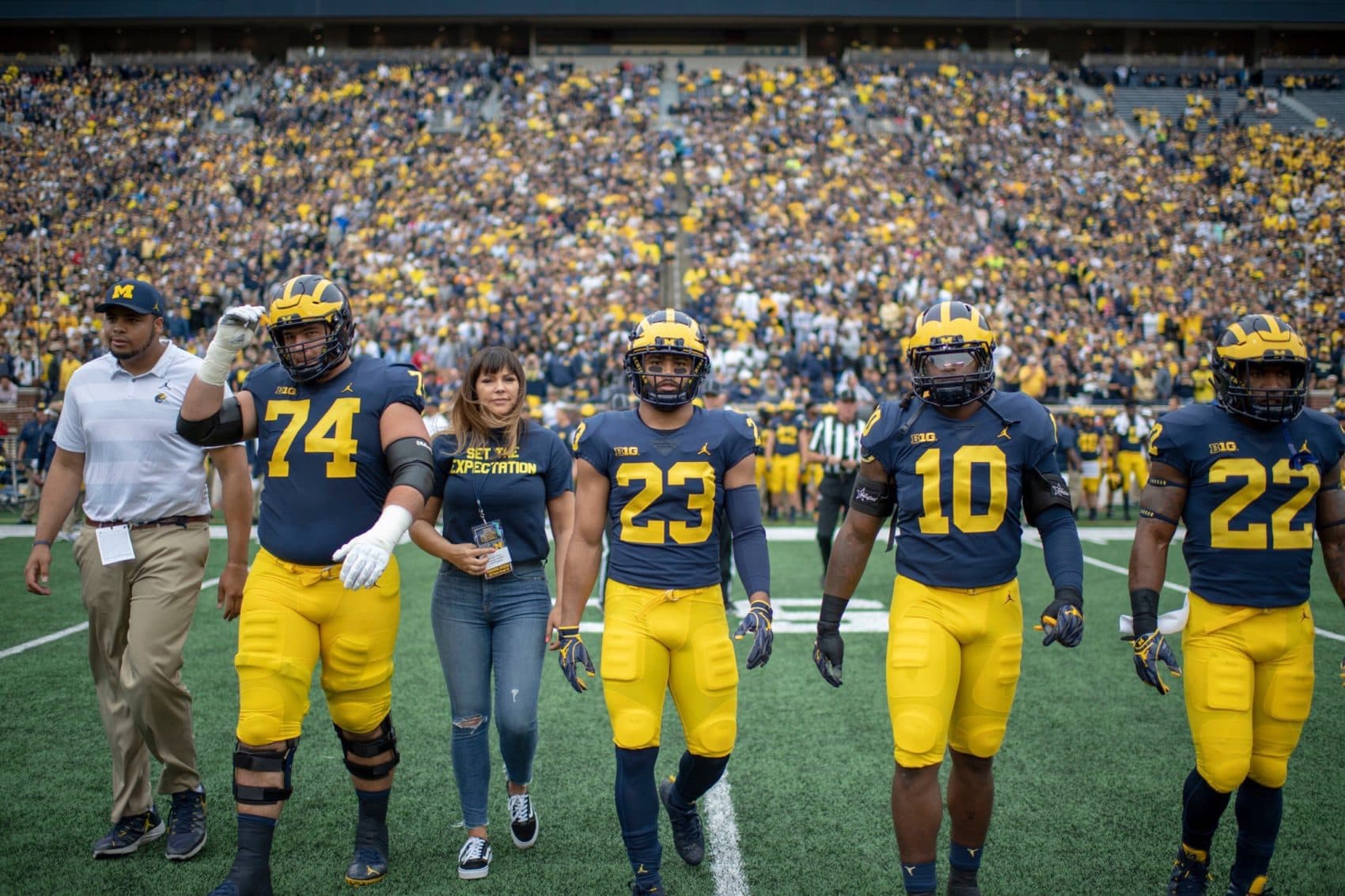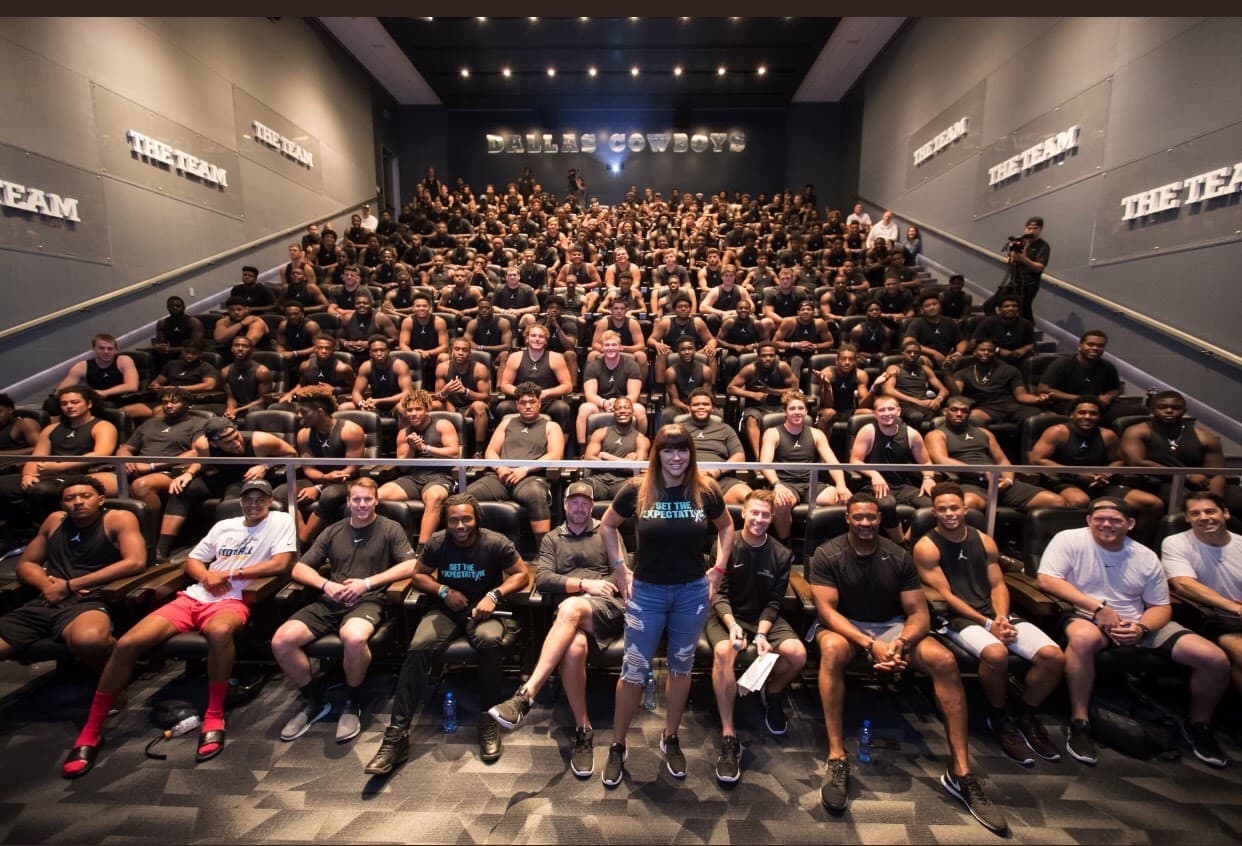Advertisement
Brenda Tracy Fights Sexual Violence, One Locker Room At A Time
Resume
Editor’s Note: This story discusses sexual violence. Use your discretion.
It was the fall of 2014. Brenda Tracy had just turned 40, and she was in crisis. After years of trying to ignore what had happened to her during the early morning hours of June 24, 1998, she’d finally started seeing a therapist.
"I felt like I'd opened Pandora’s box — and I didn’t know what I was going to do, and I didn’t know how to find closure," Tracy says. "So, one night while I was, you know, angry and trying to figure this out, I thought about Coach Riley."
Mike Riley had been the coach of the Oregon State football team back in 1998. He left for the NFL the following year. After a few seasons in the pros, he was coaching at Oregon State again.
"And I thought, ‘Well, I don't like him. I've been angry with him for all these years ... Maybe I could find healing through him,’ " Tracy recalls.
Tracy knew she couldn’t just walk into Riley’s office and say, ‘Remember me? From 16 years ago?’ So instead, she turned to Google.
"As I was reading about him, I was literally reading years and years and years of articles about what a great man he was," Tracy says. "And that didn't resonate with me at all."
One article among the dozens chastised Riley for his handling of a player accused of domestic violence.
"And I clicked on the reporter, and I said, ‘See, Coach Riley is not a great guy — this is what happened to me,’ " Tracy recalls. "And I just wrote an angry email to someone. I didn't even know who it was."
The reporter was John Canzano, a columnist for the Oregonian.
"I almost fell off the couch," Canzano says. "Because it’s not what you expect. It’s not the narrative that you get on Mike Riley.
"Essentially, she was saying, ‘You know, Mike Riley — I don’t trust him. He's not a reputable person. And he didn’t support me in 1998 when I was gang raped.’ "

'He Was Supposed To Be A Good Guy'
In 1998, Brenda Tracy accused four men, including two Oregon State football players, of gang rape. But for reasons we’ll get into a little later, she didn't agree to testify in court. After the charges were dropped, Riley gave the Oregon State players a one-game suspension and described their actions as "a bad choice."
"He was supposed to be a good guy. He was supposed to be building men in a football program," Tracy says. "I don't know how gang rape is a bad choice, and I didn't understand the one-game suspension. I mean, are we good people if we don't do the right thing?"
But, as far as John Canzano knew, Mike Riley was a good person. Everyone thought so.
"You know, this is not a guy who’s even using profanity out on the football field," Canzano says. "He rode his bicycle to practice. Very folksy, very home down. Cares about kids. So you thought that, you know, here was a guy — if anybody was going to be an advocate for a survivor, it was going to be Mike Riley."
Tracy agreed to meet Canzano for coffee in the lobby of a downtown Portland high rise.
"She had in her hands a manila folder," Canzano remembers. "And inside of it was the case file for her gang rape. And you could tell it wasn’t a fresh copy. It was something that she had carried around.
"She told her story — I almost felt like she expected me to not believe her."
But Canzano believed Tracy, right from the start. And there was something else he took from that meeting.
"It wasn’t going away for her. It wasn't ending for her," he says. "And I didn’t know that I could necessarily play a role in getting her a resolution. But, you know, she stood up, and I hugged her. And I told her, ‘You've got a story. This is a story.’ "
"And I said, ‘John, what story? Seriously, who cares?’ " Tracy remembers. "Nobody cared then. Why would they care now? And he's like, ‘No, I think you could help someone.’ And I said, ‘Fine — put my name and my face on it.’ And that's how it happened."
Tracy told Canzano that she saw herself as a victim. But Canzano saw something else.
"I said, ‘She's gonna be governor,’ " Canzano remembers. "And I said that before we even wrote the first piece. Because I just felt like she had something. There was something to her that was much bigger than anything that had ever happened to her."
June 24, 1998
So, here’s what happened to Tracy. Or, at least, here are the details we can put on the radio.
"I was sexually assaulted by four men," Tracy explains. "I believe I was drugged. So I was in and out of consciousness for my attack, which lasted about six hours — and I know this from the police report.
"I then went the next morning and got a rape kit at the hospital. I made a report to the police. All four men were arrested and charged. They were all facing 20 years in prison.
"But because two of them played for Oregon State University, the backlash was quick.
"I started receiving death threats. Given the pressure, and also the [district attorney] saying I didn't have a good case. The DA said it was a ‘he said, she said.’ I dropped the charges. And then my community said, ‘See, we told you she was a liar. Because if she was really raped, she would prosecute.’ "
And this is where that case file comes in — the one Tracy carried around in a tattered manila folder. Because according to the police report, she had a really good case. All four men had admitted to sexual contact with her. They’d also admitted that during those six hours, she said “no” many times and begged one of the men to stop.
They said, ‘Did you force her to do this?’ ‘Yes, I did — but it wasn’t rape.’
John Canzano
"They said, ‘Did you force her to do this?’ ‘Yes, I did — but it wasn’t rape,’ " John Canzano recalls. "I mean, it was a slam-dunk case when you talk to prosecutors."
Canzano did talk to prosecutors. To be precise, they told him that there is no such thing as a slam dunk when it comes to prosecuting sexual assault cases — but this was pretty close.
But Tracy says nobody told her that.
"The district attorney’s office should have put their arm around her and said, ‘Look, were in this together. Let’s get you the counseling you need, and let’s get these guys off the streets,’ " Canzano says. "And instead, when she said, ‘I don’t think I can do this,’ they said, ‘Okay.’ And they moved along. And that didn’t serve the community, it didn’t serve Brenda. It didn’t serve anybody but that football program."
The Investigation
In his investigation, Canzano found that the district attorney’s office, the police and the university had a history of holding annual meetings to discuss how to handle cases like these.
Canzano spoke with prosecutors and with university representatives. He even managed to speak with one of the men Tracy had accused, though he still denied that what happened that morning was rape. Canzano says he reached out to Coach Mike Riley early in his investigation.
"I expected, in my experience, that it was going to be very difficult to get him to make a comment," Canzano says. "And I got a surprise, like, two or three days into this where he returned a call himself. And he owned it. And just said, ‘I had no idea.’ "
Unlike the university he worked for, Riley never saw a copy of the police report, according to Canzano.
But Brenda Tracy didn’t know that. All she knew is that a coach — a man charged with building young men — had described her gang rape as "a bad choice".
"I can rationalize a rapist," Tracy says. "I can even rationalize bad people. They do bad things and they hurt people. But I can’t rationalize good people who don’t do the right thing."
On Nov. 14, 2014, Brenda Tracy’s story was printed in the Oregonian. It was the first time she was publicly identified.
This time, Tracy's community believed her.
"You know what — amazingly, they did," Tracy says. "I was really surprised. " 'Cause this is before the #MeToo movement. This is before all the scandals we've been seeing in sports. Baylor and all that. But it was amazing. My community this time believed me. And they reached out to me. They loved on me."
"I think you had a lot of Oregon State fans who were saying how disappointed they were with the administration at that time — and had the university saying, ‘We could have done better’ and a football program say, ‘We could have and should have done better,’ " Canzano recalls.
Six hundred seventy-one comments were left on that story. One was signed by Coach Mike Riley.
"Initially, I thought, ‘That can’t be real,’ " Canzano remembers. " ‘That has to be somebody faking. Who does that, right?’ "
It was real. Here’s what it said:
“Today’s column by John Canzano regarding the circumstances of sexual assault on Ms. Brenda Tracy is shocking and her suffering saddens me. It is with heartfelt compassion that I will reach out to Ms. Tracy and offer to assist her. I hope we have the opportunity to meet in the near future, and if she feels comfortable, I invite her to speak to the football program. Her experiences would be a powerful message and one I know our whole team would take to heart.
Mike Riley
Head Football Coach
Oregon State University”
"There are so many coaches in today’s world of college football that would claim amnesia — they'd lie," Canzano says. "But here was a coach who was willing to say, ‘You know what? I could have done better. And I want to meet her, and I want to tell her that in person. And I want her to talk to my team. I didn’t think it was lip service from him.’ "
We tried for months to schedule an interview with Mike Riley for this story. And while he told us that he’d "love to talk," we were never able to make it happen.
'This Is An Issue Men Need To Solve'
In the months after the article and The Oregonian’s follow-up investigation were published, Canzano and Tracy spoke often, at town hall meetings and community gatherings.
"The room was always full — but it was full of women," Canzano remembers. "And she would say, ‘I wish we could get to men, because this is an issue that men need to solve.’ "
And this is an important point. When Tracy says this is an issue men need to solve, she’s not saying the obvious — that men need to stop committing crimes of sexual violence. Yes, the vast majority of sexual crimes are committed by men. But the vast majority of men will never commit a sexual crime.
"It's, like, 10 percent of our male population that are committing crimes of sexual violence, which means 90 percent of our men don’t," Tracy says. "But the 90 percent can be complicit in their silence. They can be complicit in their inaction. So I need men to get involved. I need them to become active.
"If the 90 percent of the population — men, women, LGBTQ, however you want to identify yourself as a human — would push back on the 10 percent, maybe we could gain some ground on this. Maybe we could stop this travesty."
When John Canzano hears Brenda Tracy speaking like this, he realizes that his first assessment of her was wrong. Really wrong.
"I now realize, governor was too small," Canzano says. "Like, I think she's got a bigger role. I don’t know if it’s as a lawmaker or as somebody who's just going to change the viewpoint that men have about women."

Through her advocacy work, Brenda has helped change the laws in Oregon, to extend the statute of limitations and protect the rights of rape survivors. And she’s spoken to thousands of college athletes to bring them in on her mission.
But to do all that, Tracy first needed to reach men with her message. And that wasn’t going to happen as long as women were the only ones showing up to her talks.
Reaching Coach Riley
This is where Coach Mike Riley comes back into the story. Two years after John Canzano’s articles were published, in the summer of 2016, Riley wasn’t coaching at Oregon State anymore. He had taken the head coaching job at Nebraska.
"I actually didn't think that I would hear from him," Tracy says. "I was a little bit of a PR nightmare for him. I was talking a lot about how much I didn't like him in the media, but he reached out to me from Nebraska and invited me to still come there."
After a brief phone call that she describes as "superficial," Brenda Tracy flew to Nebraska to speak to Coach Riley and his football team.
"His assistant was bringing me in," Tracy remembers. "And he kind of pointed at an office. And I remember — I froze in my tracks. And I said, ‘Is he in there?’ And the man said, ‘Oh, my god. Yes, he is. Are you OK?’ And I took a big, deep breath. And I was like, ‘Yeah, I'm OK.’
"But then I had to tell my brain, ‘Tell your right foot to move. Tell your left foot to move.’ I was having to tell myself, like, ‘Move your feet, Brenda. Walk forward, Brenda.’
"And I got into the doorway and looked up. And I'll never forget this — his face became bright, he smiled and he said, ‘Hi, Brenda.’
"And I immediately began to cry. And we hugged, and I cried on his shoulder for about a minute. It was amazing. And then I sat down and told him how much I hated him for 16 years.
"Wow, Coach Mike Riley is a lesson for all of us in accountability. He held himself accountable to me. He apologized to me. There's a big difference between ‘I'm sorry, period’ and ‘I'm sorry, but ...’ and Coach Riley did the first. And it meant everything to me, and it was a huge moment in my life. And it did a lot for my healing."
A few minutes later, Coach Riley took Tracy into the team room, where 120 football players had gathered to hear her story.
"Coach Riley stood right off to the side of me, where all of his players could see him — he was holding himself accountable to them," Tracy says. "And I told them my story. And I didn't leave anything out. I didn't sugarcoat anything. I was brutally honest and brutally graphic. And I even said to them, at one point, ‘I hated your coach more than my rapists.’
"And they all looked at him. He didn't flinch. And they all looked back at me, because they didn't know what to do with that. And I could tell that they were uncomfortable — I was uncomfortable, too."
An Ongoing Mission
That night, the story of Brenda Tracy's and Mike Riley’s unlikely reconciliation was all over the news. And word got around to other athletic departments at other universities.
"Like, another school called, and then another school, and another school, and another school — and it's just been, kinda, going now for, like, what, two and a half years now?" Tracy says.

Every time she speaks to a team or athletic department, Brenda makes herself and her audience uncomfortable … on purpose.
"Because the thing is that if I say to you, 'I was gang raped by four men for six hours,' I don't know what that means to you. And most likely you're going to sugarcoat it in your own mind, so that you can be comfortable with what happened to me," she says. "But I need you to be uncomfortable. I need you to recognize that I'm the victim of a crime, and so I have to tell you, in graphic detail, what that means. And that's what I do. And then, when I talk to you about my life now, my advocacy, then you have no choice but to see me as a victim who has now become a survivor."
Sometimes, a player will come up to Tracy after her talk and disclose that he, too, is a survivor. Often, it’s the first time he’s disclosed to anyone.
Tracy says she lives in a lot of trauma. But she says it’s worth it.
"In all of my talks, when I sit in the room with these men, there's a point where I say, ‘I'm not here because I think you're the problem — I'm here because I know you're the solution,’ " Tracy says. "If women could stop sexual violence, we would have already done it. Like, I wouldn't be a gang rape survivor — the woman before me would've made sure that that didn't happen to me.
"I think most of the time we spend our time, kind of, wagging our finger at them — telling them what not to do, telling them that they're the problem. And I'm, like, the first woman they've seen that says, ‘I'm here to tell you what you can do.’ And they love it."
These days, Brenda Tracy travels from school to school, speaking at as many as she can. She has trouble remembering what time zone she’s in. She’s given up her career as a nurse to focus on her advocacy work full-time. But still, she says there simply isn’t enough time to fulfill every speaking request.
"I don’t solicit myself to any school," Tracy says. "Every single school that I've been to — every single program that I've worked with — they've found me, and they've invited me in. And it keeps on going. Men want to be involved. Athletes, coaches want to be involved. And that's why they keep on calling me."
Brenda Tracy's nonprofit is called SetTheExpectation.
This segment aired on January 26, 2019.
